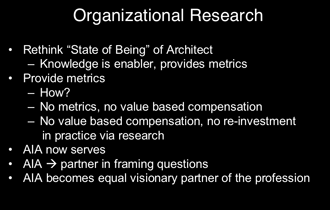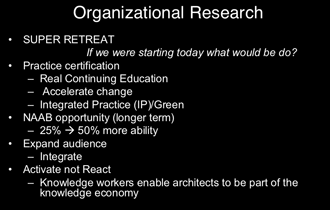|
|
Rethinking the state of being an architect—is it time to do that, based on these things? Knowledge is an enabler, and knowledge can allow us to provide the metrics to a new, reasonably enlightened clientele. In that way, we can use metrics to demonstrate, from the standpoint of the design profession, the value of our work. Then we can base our compensation on value. From compensation based on value, we have some success with that, and then we have the resources to reinvest into the research. It becomes a cyclical kind of a model, like we have discussed. So, the AIA as an organization today is an organization that serves its members.
What if the AIA became a partner with the profession in framing the questions from which the knowledge is developed? That needs to include everybody, not just talking to ourselves. If the AIA did that, then the AIA truly becomes not just an organization that serves but also a visionary partner.
This goes back again to the cycling of the development of knowledge—the knowledge becoming value, value increasing compensation, and then the compensation supporting more knowledge development. We need a couple of things to enable that. One thought was that we have AIA150 going on right now—the 150th anniversary of the AIA—and we have some programs. But what if AIA150 included, as a project, a format to rethink what the AIA is—how the AIA is the community, and then how it relates and serves what vision as a partner of the profession? We thought about whether there could be a project such as a super–retreat: If we were starting today to design this organization fresh, what would it be? We thought that this process would need to include everyone who’s involved and engaged. It would be a super-retreat, using the term “super” because it would integrate all disciplines, all of the skills necessary, coming together to define the AIA of the 21st century. This is probably the single most important opportunity we have to protect the future of the profession.
>
01 02 03 04 05 06 |
|


|
